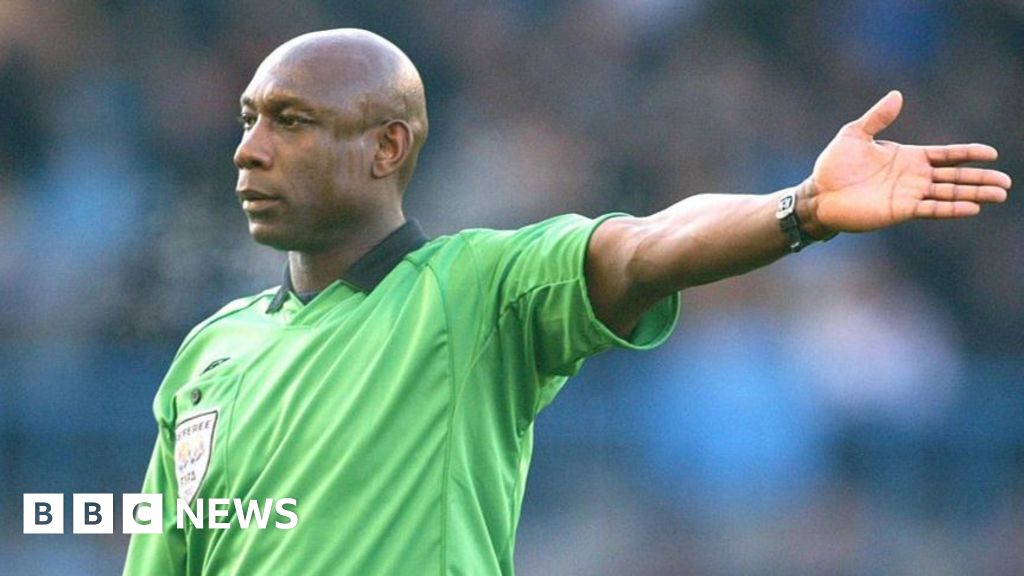Ex-Premier League referee Uriah Rennie 'learning to walk again'

'I was a Premier League referee, but now I'm learning to walk again'7 minutes ago Share Save Lucy Ashton BBC News, Yorkshire Reporting from Sheffield Share SaveBBC Uriah Rennie, 65, was hospitalised for five months after a rare condition left him paralysed from the waist downUriah Rennie became a familiar face to millions of football fans after becoming the Premier League's first black referee. Once described as the "fittest" match official in global football and a martial arts expert, he is now learning to walk again after a rare condition left him paralysed from the waist down. After spending five months in hospital, the 65-year-old has spoken to BBC News about rehabilitation, his fighting spirit and a brand new role.Rennie, who officiated more than 300 top-flight fixtures between 1997 and 2008, was on a birthday trip to Turkey last year when he was hit with a sudden striking pain in his back. "I thought I had just slept funny on a sun lounger, I was hoping to go paragliding but because of my backache I couldn't go," he says. "By the end of the holiday I couldn't sleep a wink from the pain, and by the time I got home I could barely walk."Richard Sellers/Sportsphoto/Allstar/Getty Rennie was a referee in both the top flight of English football and on the international stageRennie made history in 1997 when he officiated a match between Derby County and Wimbledon, becoming the top division's first black referee. Tall in stature and a kick-boxing and aikido expert, protesting players rapidly discovered he was more than comfortable standing his ground during arguments. A magistrate in Sheffield since 1996, he has campaigned for issues such as improving equality and inclusion in sport, supporting mental health and tackling deprivation. Rennie was on the verge of starting a new role as Sheffield Hallam University chancellor when he was admitted to Northern General Hospital in October. "I spent a month laid on my back and another four months sitting in bed," he says. "They kept me in hospital until February, they found a nodule pushing on my spine and it was a rare neurological condition so it's not something they can operate on. "I have had to learn to move all over again, I'm retraining my legs."Stu Forster/Allsport/Getty Rennie famously sent off then-England and Newcastle captain Alan Shearer on his 100th appearance for the Magpies"It was strange - I went from running around the city to in essence being in traction for such a long time. "I didn't have any previous back problems but quite suddenly I wasn't able to move and was in a spinal unit." Discussing his current movement, he says: "I can move my feet and I can stand with a frame attached to my wheelchair but I need to work on my glutes." He jokingly shows the wheelchair scuffs on the skirting boards around his home, with physiotherapy currently taking up much of his day. "I rock around in my chair doing my exercises, I'm a very good, compliant patient," he laughs. "It has been frustrating but family and friends have been invaluable, the hospital was absolutely superb and the university has been exceptional."Rennie spent five months in a spinal unit and has to learn how to walk againHe officially starts as university chancellor in May, a position he has been determined to take up despite his recent experiences. "I emphasised I wanted to make a difference to Sheffield and to communities here," he says. "I carried on working with community sports teams while in hospital, directing them from my bed." He studied for an MBA at the university during his refereeing career and received an honorary doctorate in 2023 for his work with sport and local communities. Sam Allison: Why has it taken 15 years for another black Premier League ref? "I'm aiming to be the best I can physically," he says. "No one has told me I won't walk again, but even if someone did say that I want to be able to say I did everything I could to try."Rennie, who moved from Jamaica to the UK as a young child and grew up in the Wybourn area of the city, says being the first black referee was about "creating a legacy to enable other people to stand on your shoulders". Discussing his latest challenge, he says the spinal cord compression has given him a new outlook on life. "Lots of people are in wheelchairs, but it doesn't define them," he says. "It has made me resilient and forceful and I will never give up - I'm not on my own, there is a village helping me." He concludes: "I recognise how brittle things are in life now. "I don't know if I am going to walk fully, but I know what I need to do to try and you must never give up hope."














